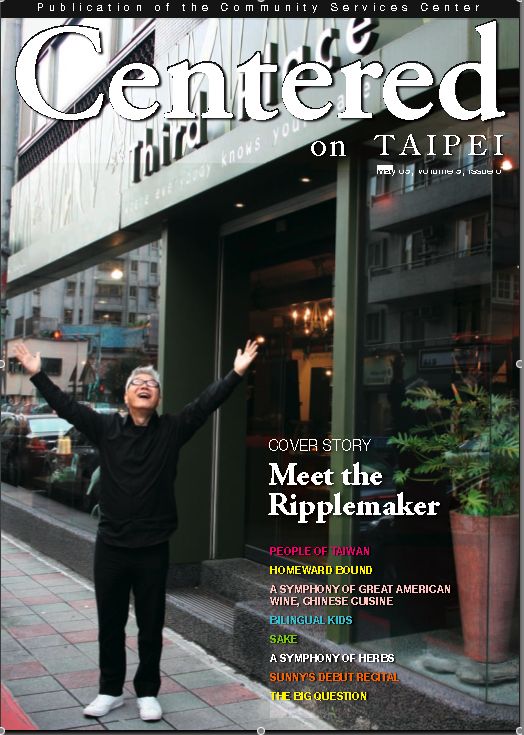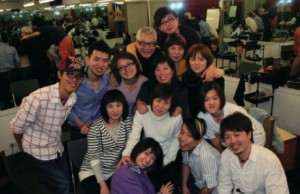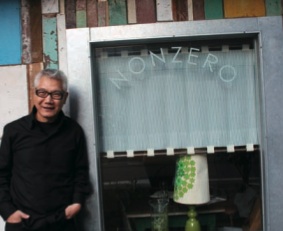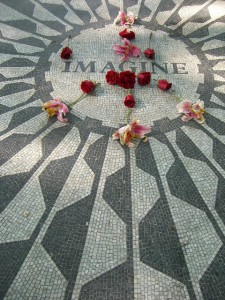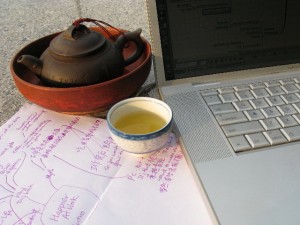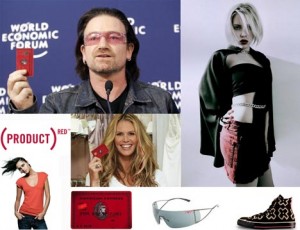時常造訪我部落格的人都知道,我認為一個好的部落格,不在文章的多少?而在於回應的內容品質。我非常驕傲有許多好朋友參與,讓這部落格成為我們共同體驗生命的聚會所。當您們有任何問題,我都歡迎您們在此分享。要再一次的抱歉,我用英文回答您們的問題(千萬不要怕英文。這部落格的成立就是要在台灣建立一個英文友善的網路環境。)英文只是一個工具,一個讓我們獨立尋求答案,跟世界溝通的工具。雖然我並不能給您們任何答案,但經過不斷的問對的問題,您慢慢會自己找到答案。
在最近的一次 Ppaper Business 06 中,我寫了一篇有關Kiva.org的文章,得到許多年輕朋友回響,經過他們同意後,我將其中兩人跟我的來往e-mail分享 於後,希望大家能開始對自己及對社會更有信心,不斷的問自己三個問題:
1. What do you hope to achieve in life?
2. What is important to you now?
3. What topics are you most concerned about?
用心的找出這些答案,一直在心中醞釀打量,有一天當您準備好時,就是您開始行動時。
永遠不要放棄成為一個Better Person的機會。
這是與LL有關kiva的來往信件。
—————————————————————————————————-
Dear Mr. Chu,
First of all, I really like what you mentioned in your blog posts and articles: you’re a businessmaker, daymaker, ripplemaker. I like the “ripplemaker” especially, because I’m always trying to be a ripplemaker. I firmly believe I can help or change others once I try to do so.
I’m a graduate student studying in NCCU(National Cheng-Chi University and majoring MIS(Management of Information Systems). I’m also a web developer with some experience.
After reading your article on ppaper business, I decided to send a mail to you. I finished my lending process on Kiva. In fact, I have a Kiva account from last year, but I didn’t try to loan until yesterday.
I think you gave me the drive to visit Kiva again and lend some small money for those people in need. I can’t agree with you more that what you said “entrepreneurship is the best way to create jobs and resolve poverty”.
I lended us$25 to a single mother who lives in Nicaragua for helping her small business. The reason why I decided to lend to her is simple: she’s a single mother who raising a child, and she can finish expected amount after my loan. I hope it would be a little helpful for her.
For your second challenge in ppaper business, I feel it’s a very interesting topic especially in Taiwan. I’ve thought about the feasibility and market in Taiwan when the first time I heard about Kiva.
As a web developer, I think building up a Kiva-like website in Taiwan is doable. In Taiwan there are some nice web services for cash-flow, and we’ve got a large Internet popularity, and the most important one is: people in Taiwan is much richer than some countries.
I think there are some concerns if we wanna build up a Kiva-like website in Taiwan:
1. Law issue. I’m not a lawyer and not a professional for laws, but I think there must be some restrictions for this model.
2. Moral hazard and risk such as frauds, bad debts. I think people in Taiwan maybe have some experience or heard about fraudulent organization. I don’t know if it would be a obstacle for promoting a Kiva-like idea in Taiwan.
However, I think the basic idea for helping somebody to start up is definitely feasible. I don’t know how did you consider the feasibility or other related issues about it?
Last but not least, I’m really glad to send this mail to dear Mr. Chu. I think I’ll send mail to you again in the future if I have some ideas about Kiva or something. 🙂
Yours sincerely
LL
Dear LL:
Thank you for your thoughtful emails. You are my Daymaker today. Your English is excellent, by the way.
The idea of my column on Ppaper Business is not to introduce Kiva but to get more people to take action and become Kiva member. It is not the money it counts, it is a way to know yourself. Why did you not loan this US$ 25 when you got excited about Kiva? This self reflection will teach you to know yourself. On the other hands, after learning this about yourself, you got involved with Kiva and loan US$ 25 and become a proud Kiva loan giver. You are on your way to do great things in the future. Now, you are thinking and doing things differently.
Look at the mirror and change the man inside.
Yes, I know there is legal issue on this in Taiwan. Kiva has even more problems in the States. However, they set up it as a non-profit and got into a gray zone when they started. Now, they have in house legal advisor to guide them to comply with the law.
I also know “104 boss” in Taiwan has the similar concept but poorly designed and poorly executed. Prosper has been shut down due to the for-profit nature of the business and the high deliquency rate.
Kiva is micro loan to the real poor people through other partners in the field. The repaid rate is so high that it has become a golden standard. They can make US$5.0 million loan a month now. What a accomplishment?
My good friend, Wendell, told me the culture thing is in the way. Taiwan is a low trust society. We are too smart to trust anyone. Please take a look on Kiva’s member list. They are all normal people with middle class income. They are happy because they want to share happiness. I believe we have enough this kind of people in Taiwan. We just need to find a way to release this powerful intention. Your talent in web design and system implementation could be a great asset for us to launch a great web based social entrepreneur. Are you that good? 🙂
Kiva is a concept. we can leverage this concept to build a web based platform to help people lift their poverty or any other causes.
Please keep in touch so we can create a think tank to use web to do good things.
Be the change, Ping
----------------------------------------------
這是與RR有關kiva的來往信件。
----------------------------------------------
Dear Ping,
This is the first time I try to mail you some of my thought. I’m 18 now, and studying computer science in NCCU. I’ve read ICB and ppaper since I was a high school student.
I have great interested in Web technology and business. I’ve learned related skills for 3 years and an intern Web developer in a company for 1 year. This summer, I’m dedicated to an independent website startup, and hoping that I can do something amazing.
The love of the internet is why I feel really excited as I read your article in the latest magazine.
I think Kiva is revolutionary because it show a whole different approach and possibility of charity. It reminds me of Red product project. Most of us consider doing charity to be donating something like money or time but both of Kiva and Red are not.
Actually, Kiva isn’t a new idea and I’ve learned it years before. I still remember either Kiva or Prosper was popular in 2007. In Taiwan, there is no trouble to build such a website. Any senior web developer like me can build a full functional one by himself. As far as I’m concerned, the main problem we’re faced with is that such an abnormal loan agency which perform every operation peer-to-peer and online might be illegal in Taiwan.
To be frank, the reason why I send you the mail is not only because I want to share some of my idea but also want to help you to build up a Kiva-like website in Taiwan. I’m sure that I have great ability of Web design and development. If you have any problem or just need some help, please tell me. I would be glad if I can take part in such an revolutionary project.
I’m looking forward to hearing from you and thank for your reading.
Best Regards,
RR
Dear RR:
Just a quick note to thank you for your can do spirit. I would love to meet you and connect you with other young people who are aspiring to be a web entrepreneur.
Fist thing first, I still want you to join the Nonzero Club and loan US$ 25 to a selected third world entrepreneur. I will reimburse you this amount of money when we meet later.
The idea of my column on Ppaper Business is not to introduce Kiva but to get more people to take action and become Kiva member. Richard, if you don’t take action and loan the US$ 25, you are not the person who will start a business for the good of society. It is not the money it counts, it is a way to know yourself. Why did you not loan this US$ 25 when you got excited about Kiva? This self reflection will teach you to know yourself. On the other hands, after learning this about yourself, you got involved with Kiva and loan US$ 25 and become a proud Kiva loan giver. You are on your way to do great things in the future. You are thinking and doing things differently.
Now, you know how our youth’s attitude about starting their own business. People just got infomation on what’s cool, not many of them actually take action and participate. Only through the personal experience in Kiva and engage with these poor entrepreneurs seeing them to be successul ( repaid the loan ), you will get a sense of joy and know you are a good man.
Look the mirror and change the man inside.
Yes, I know there is legal issue on this. Kiva has even more problems in the States. However, they set up it as a non-profit and got into a gray zone when they started. Now, they have in house legal advisor to guide them to comply with the law.
I also know 104 boss in Taiwan has the similar concept but poorly designed and poorly executed. Prosper has been shut down due to the for-profit nature of the business and the high deliquency rate.
Kiva is micro loan to the real poor people through other partners in the field. The repaid rate is so high that it has become a golden standard. They can make US$5.0 million loan a month now. What a accomplishment?
My good friend, Wendell, told me the culture thing is in the way. Taiwan is a low trust society. We are too smart to trust anyone. Please take a look on Kiva’s member list. They are all normal people with middle class income. They are happy beacuse they want to share happiness. I believe we have enough this kind of people in Taiwan. We just need to find a way to release this powerful intention. Your talent in web design and system implementation could be a great asset for us to launch a great web based social entrepreneur. Are you that good?
Kiva is a concept. we can leverage this concep to build a web based platform to help people lift their poverty or any other causes.
Be the change,
Ping
www.pingchu.com
www.twitter.com/pingchu
Please visit my blog and get to know me better before we meet.
Dear Ping,
I feel glad and really appreciate your reply. I’ve been once afraid that you might be unwilling to talk to such a young guy.
Today, I’m delighted to tell you that I’ve almost made my first loan on Kiva.org. To be frank, when I read your mail this afternoon, I felt a little embarrassed since I forgot that the most important thing is to participate. Thank you again for reminding me what really counts. It gave me a chance to know more about myself.
The experience of making loan is fun as well. I spent about three hours browsing the site and tried to find out the ideal entrepreneur. I chose a herbal seller in Ghana, which is a country I’ve never heard before, as my first try for I believe if I can help him, he can help other people in need in his country. That is, he can spread the goodness.
I even told my father about Kiva. He also consider it workable and was amazed by such an idea. My dad is a good man. He has donate to the charity every year. What’s more, he decided to make his first loan with me. He chose three brothers in Cambodia because he find a dream in their eyes.
However, when we want to check out. We encountered a problem that we have no paypal account. Soon as we finished signing up an account, we still need to wait for the credit card verification.
I’m looking forward to make my first loan. I’ll write more about how I feel after I successfully help other entrepreneurs in the third country.
By the way, I read a part of your blog, and would like to have a copy of daymaker. Could it be possible for me to get one in any bookstore or it’s only available in Aveda?
Best Regards,
RR
Dear RR:
“He chose three brothers in Cambodia because he finds a dream in their eyes.” Kudos to your dad for me.
It is occasionally having met a reader like you that made all my efforts worthwhile. You are my Daymaker today.
I also spent lots of time to find the right entrepreneurs to loam my money too. It is a really fun experience. You know you have been a responsible global citizen through your own effort. The world is always changed by these small group of enlightened people.
I, especially, love to know that you got your father interested in this endeavor. It must be a great father and son bonding. You will get your Paypal account soon and you will be able to explore more and help more people.
You are right on that the participation is the only way to learn. Let’s refuse to be a silent observer and let our life passing through in front of our eyes.
You can purchase Daymaker book only from Canmeng Aveda store and network. Please check http://www.canmeng.com/?p=stores for location. Thanks for your support.
Please keep Daymaker movement alive.
Love,
Ping

